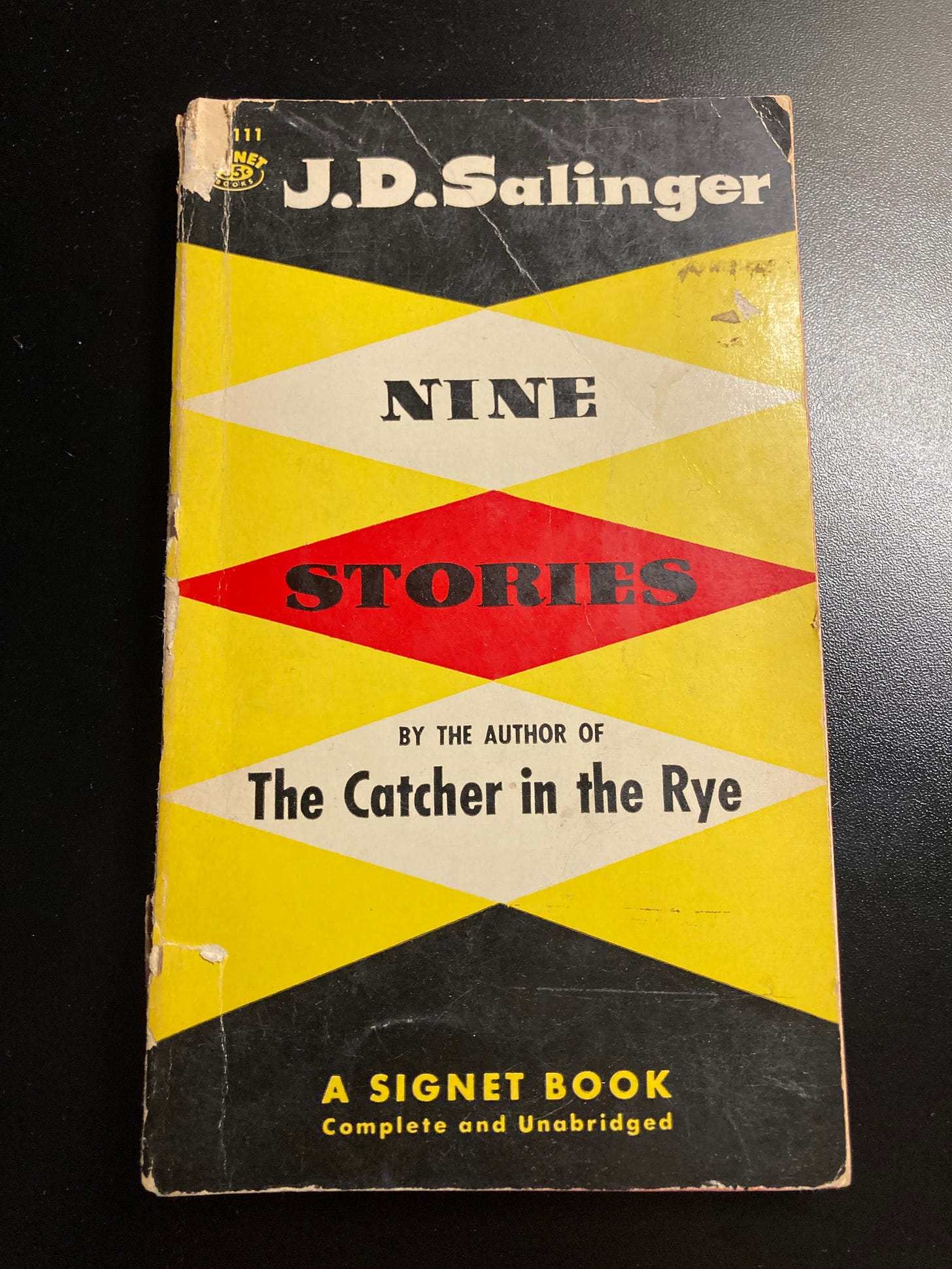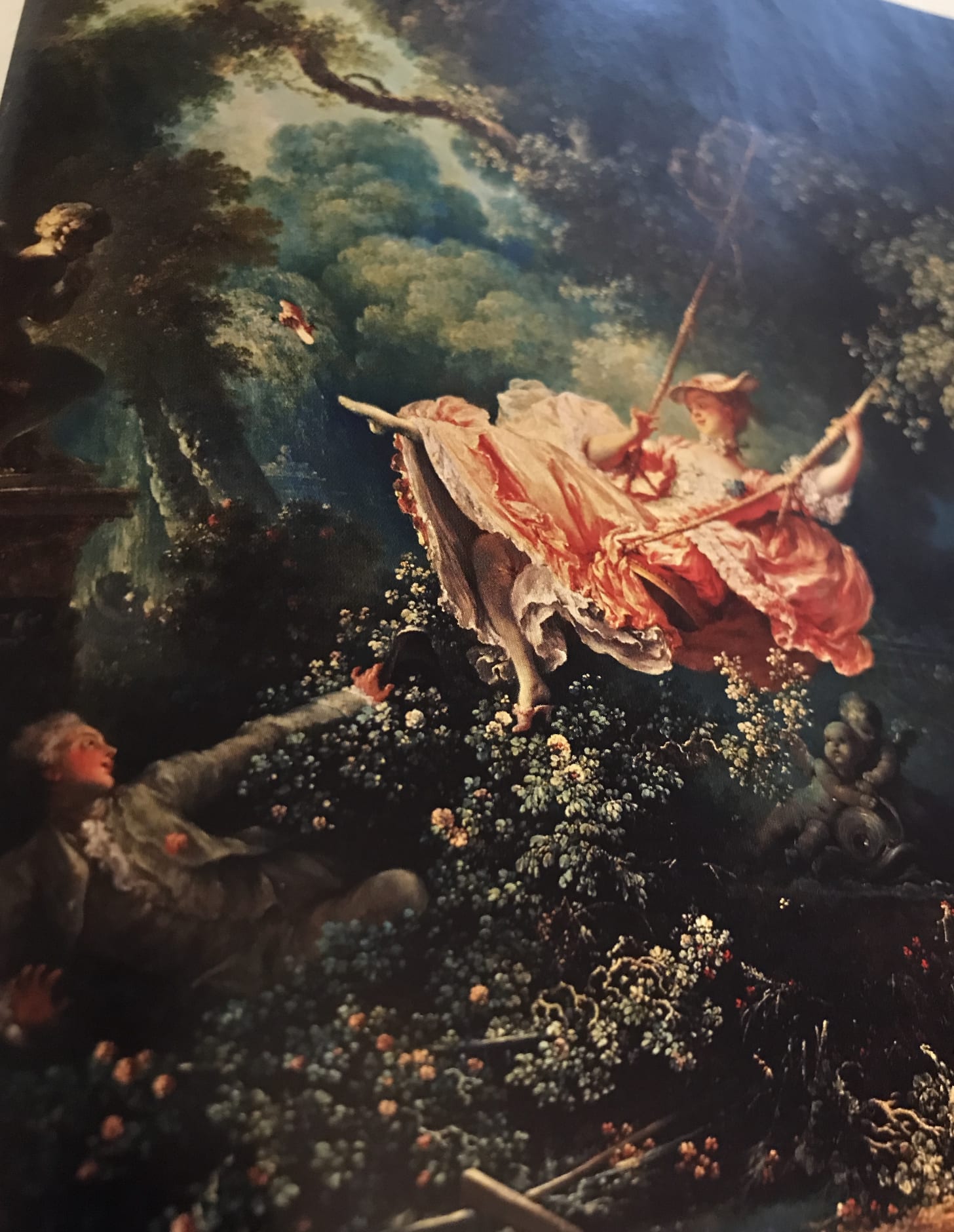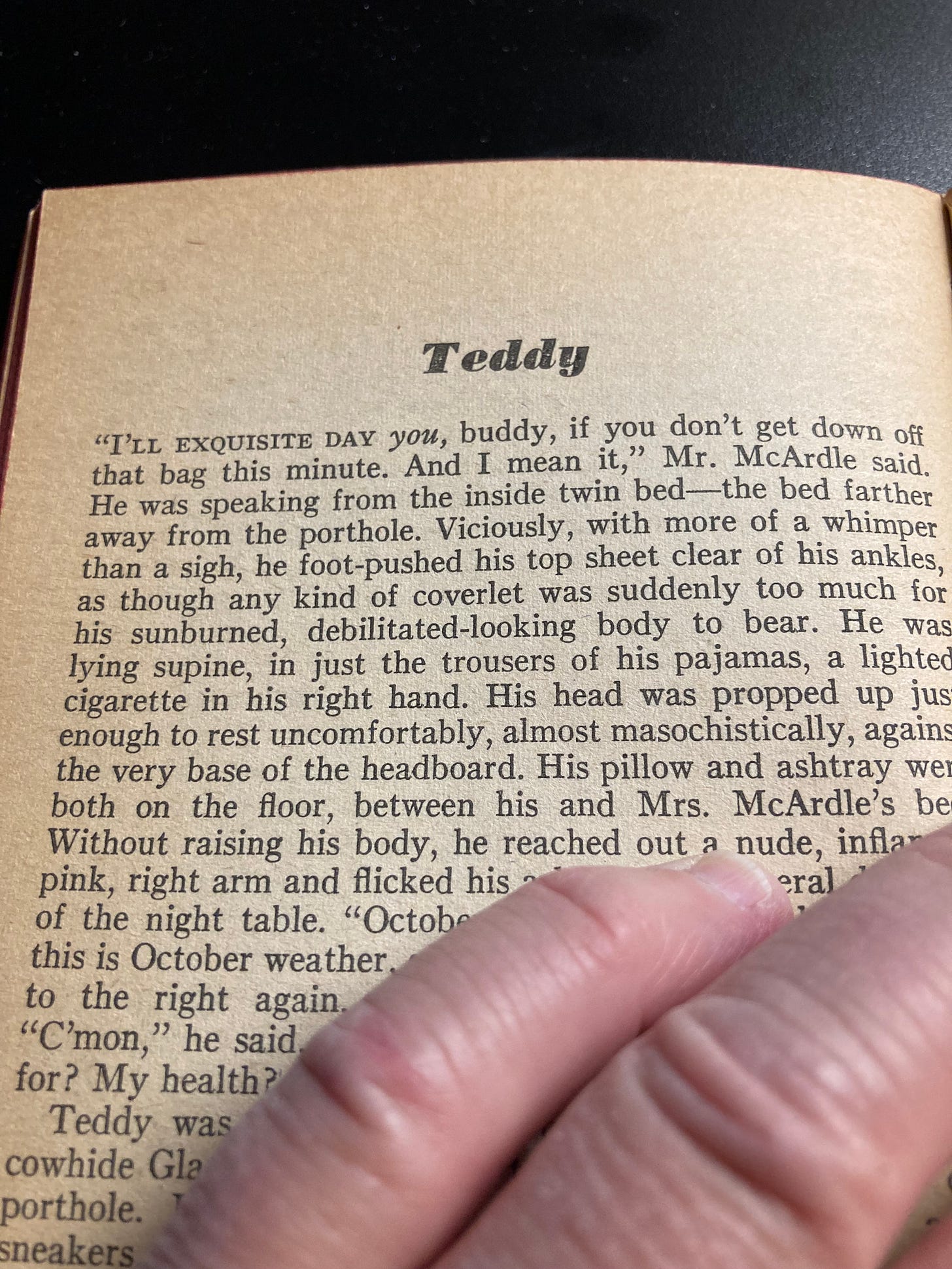What to Do When Everybody Hates You
Season 1, #2: A Daytalking reminder that some perspective helps
“‘I hate you! I hate everybody in this ocean!’ Booper called after him.”
—J.D. Salinger, “Teddy,” from Nine Stories
EVER HAD THAT gnawing feeling you weren’t welcome the moment you stepped into the room?
Yeah, that was me about a month ago.
It really got under my skin. I was at a get-together with fellow residents in my apartment building, in the amenities room, and it was clear no one wanted to talk to me. When I tried to counter the feeling by greeting others, asking how they were, other questions—the chill was still in the air.
Two weeks later? Like nothing happened.
I thought: “Wow, what was up with that?”
Hey, relationships are like flipping a coin. You go in thinking “heads,” and end up with “tails.” Some days you’re sure it’s all “tails,” and that’s what you get (at which point you start to feel pretty smug). Time and time again: the situation flips. Weird.
I stewed over this and felt pathetic. “Should I write a Substack post about this? Does anybody else get this treatment? What’s wrong with me?”
While hanging out at a Whole Foods cafe section, I mulled this question over when Cheryl, the server, introduced me to Teddy, her coworker. “Teddy!” I blurted out. “Like in the Salinger story!” Teddy had no idea what I was talking about. So when I got home I tracked down the story, reread it, and was astounded to realize…
Salinger was the Oracle I was looking for.
It went like this…
In J.D. Salinger’s story “Teddy,” straight from the beginning, it’s clear Teddy’s father is really angry at him.
Theodore (answers to “Teddy”) McArdle is 10 years old. He’s traveling with his parents and six-year-old sister Booper via steamliner on Tuesday, October 28, 1952, from Great Britain back to New York City.

There are only a handful of location-specific scenes in this wonderful short story (which is another Salinger piece I would’ve love to have adapted into a short film—remember American Masters on PBS back in the day?—just like that) so I was hoping to tease out why any of us might feel hated (or in turn “hate” other people) through the lens of this particular Salinger story.
What’s amazing about it (the story) is all the action takes place within an hour. There’s a prediction, some discussion about reincarnation, and beautiful slices of life through the eyes of a 10-year-old boy who, it seems, is something of a bodhisattva. (Go ahead, drop the needle on your classic vinyl Steely Dan now.)
So, let’s visit the stateroom where we first meet Teddy, who will later—hopefully—lead us away from the Bitter Valley of Hate.
On the Main Deck
“He was wearing extremely dirty, white ankle-sneakers,” Salinger describes our first eyeful of Teddy, “no socks, seersucker shorts that were both too long for him and at least a size too large in the seat, an overly laundered T shirt that had a hole the size of a dime in the right shoulder, and an incongruously handsome, black alligator belt. He needed a haircut—especially at the nape of the neck—the worst, as only a small boy with an almost full-grown head and a reedlike neck can need one.”
Shock of recognition: When I was seven-years old … I was Teddy:
But let’s cut to the chase: Both parents in the story are hungover and particularly Daddy McArdle, who demands that Teddy get his sister to return his expensive camera, which Teddy lent to her. He’s furious his son did that: “Teddy. God damn it—did you hear me?”
We get a last look before Teddy goes to retrieve the camera. Salinger lovingly paints the picture:
Teddy turned around at the waist, without changing the vigilant position of his feet on the Gladstone, and gave his father a look of inquiry, whole and pure. His eyes, which were pale brown in color, and not at all large, were slightly crossed—the left eye more than the right. They were not noticeable at first glance. They were crossed just enough to be mentioned, and only in context with the fact that one might have thought long and seriously before wishing them straighter, or deeper or browner, or wider set. His face, just as it was, carried the impact, however oblique and slow-traveling, of real beauty.
There you have it: The first lesson. When you’ve been greeted by animosity or hate…Give a look of inquiry. Be whole and pure (I’d say, “Remain open.”).
Hey, what’s up, haters?
On the Sports Deck
This is where Teddy finds his sister Booper, who’s been berating a younger boy named Myron. Booper says she hates Myron.
“You’re the stupidest person I’ve ever met,” she says to Myron. “You’re the stupidest person in this ocean.”
Teddy wastes no time rescuing Myron. “He is not,” Teddy says. “Myron, you are not.”
This, my friends, is called “lovingkindness.”
As far as I know, every religion espouses it, but few adherents practice it. Why don’t they? Because it’s not easy. It involves a declaration, as Teddy does so well (“He is not.”), as well as affirmation (to Myron, who needs it, “Myron, you are not a stupid person.”). Also, as Teddy tells Booper, “Give me your attention a second.” Teddy knows his sister. He knows she’s flinty and a total sourpuss. He gets right to it, but stands up to the victims of her fiery rancor. Booper is probably the most hateful character I’ve ever read in a Salinger story (please chime in if you have others—Holden Caulfield included).
Teddy makes sure Booper returns their father’s camera, and tells Booper their mother wants to see her too. Then Teddy heads to the sun deck to await his afternoon swimming lesson.
“I hate you,” Booper screams at him as he walks away. “I hate everybody in this ocean!”
Second lesson: Learn about other people. Get their backstories, their habits and practices—then try to imagine where they’re coming from and why they might feel the way they do about anything.
Including you.
On the Sun Deck
The opposite of love is not hate. It’s indifference.
If you want to not hate something, choose indifference. It’s easier than expending emotion on trivial matters. What matters to one person might not matter to you. Of course what matters to you probably doesn’t excite very many people.
Frustrating, right? Not so fast, bud.
Let’s read on.
Up on the sun deck, Teddy plops down in a deck chair with his notebook, his daily journal. JOURNALS. Oh, wow—Hells bells, I love this kid (again, he was me).
Salinger writes, “Then, with instantly one-pointed concentration, as if only he and the notebook existed—no sunshine, no fellow passengers, no ship—he began to turn the pages.”

Teddy is left alone with his thoughts.
This kid is a cold fish, right? Right?
Hey. Give it a sec.
With twenty minutes before his swimming lesson down on the main deck, Teddy allows a young scholar to chat him up (realizing the guy knows who he is and has been shadowing him) named Bob Nicholson. He’s that weird type of hater who usually gets to you out of left field: the cynic, the critic, the naysayer, the nitpicker, the frienemy—okay, I’ll stop now, but Teddy gets a whiff of Nicholson’s rank odor.
And you know what?
He invites him to chat. Would you allow that? I’m not sure I would, but I get it. This is pure Daytalking. Teddy asks Nicholson if he’s a poet. No, alas, Nicholson replies, “Why do you ask?”
I love this. I miss this.
It used to be called “conversation.”
Teddy responds: “Poets are always taking the weather so personally. They’re always sticking their emotions in things that have no emotions.”

Of course it’s an enigmatic way to conduct a conversation, but Nicholson seems ready and able to roll with it. Teddy gives him an earful: “‘Nothing in the voice of the cicada intimates how soon it will die.’” and “‘Along this road goes no one, this autumn eve.’”
Teddy is sharing Basho’s poems with Bob Nicholson, who has not heard them before. Teddy is giving Nicholson a gift he didn’t know he wanted. Or needed.
Maybe haters were expecting something and you didn’t have the gift they wanted? Maybe you had expectations, too? Could this be the root of the problem: expectations?
Third lesson: Stay curious. If you’re invited to converse, join in. Clarify expectations, yours and theirs. That takes some work. Stay with it if you can. When you need to leave, leave. Choose your engagement level. Others may hate you for it, but that emotion is their choice, not yours.
Everybody in This Ocean…
…is an orange peel.
Remember, it’s an ocean. Not a pond, lake, or brackish backwater.
It’s a monster-sized body of water, with lots of diverse, wriggling creatures in it.
At the beginning of the story, while looking out his parents’ stateroom porthole, Teddy sees orange peels that the ship’s steward has thrown overboard.
He suddenly thrust his whole head out of the porthole, kept it there a few seconds, then brought it in long enough to report, ‘Someone just dumped a whole garbage pan of orange peels out the window!’
“They float very nicely,” Teddy says. “That’s interesting.”
Now we’re getting somewhere.
First, inquire; note; remark. Second, inquire further, ask questions, engage.
Lastly, experiment. Find your level of engagement and join in. Go where it feels uncomfortable or awkward and try to stay with that (the really hard part, which never seems to get easier), then ask yourself: “Why do I feel this way? Where is this emotion coming from?”
‘I don’t mean it’s interesting that they float,’ Teddy said. ‘It’s interesting that I know about them being there. If I hadn’t seen them, I wouldn’t know they were there, and if I didn’t know they were there, I wouldn’t be able to say that they even exist.’
Attention. It’s the only gift you have right now, living in this moment. Yeah, you. You exist. You’re reading this.
I exist, I’m writing this.
Hate is an emotion that disregards existence. I’d go even further and say it attempts to deny existence.
Love is attention. Practice attention. It is really, really, really difficult. And hoo boy, the internet sure has not made it any easier.
Over the past week I learned “everybody hates me” probably isn’t true, but I’ll leave room for any active haters to disagree.
And you know what?
I’m cool with that.
Have you had moments when a parent, sibling, friend, partner or spouse said they hated you?
How did you feel? How did you react? What did you do?






I found The Catcher in the Rye very irritating, but now I want to read "Teddy." So you've given me a gift I didn't know I wanted.
Agreed! Socially awkward is not a identity I wish to continue to cultivate.